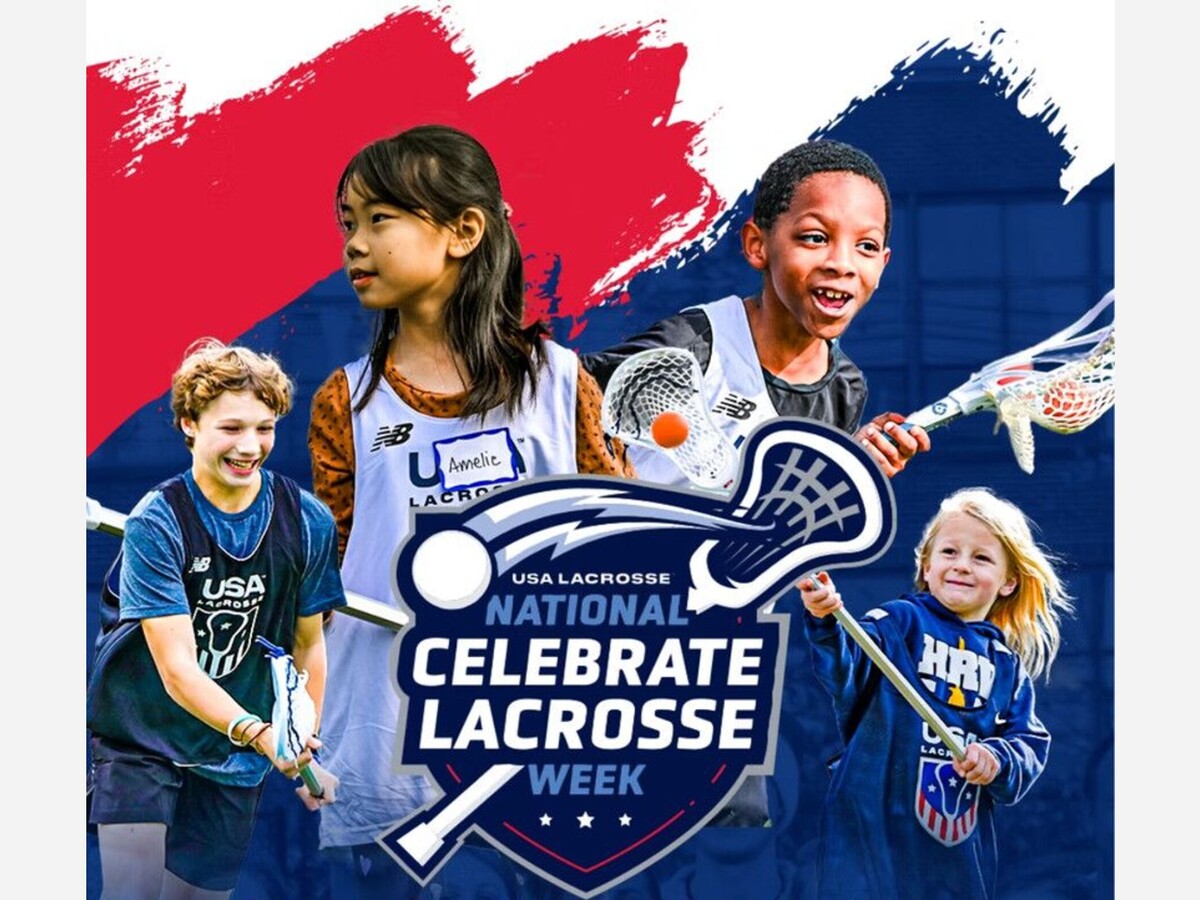Image

SPARKS, Md. — The fourth annual National Celebrate Lacrosse Week — set for Nov. 2-10, 2024— will feature over 80 Pick Up & Play clinics that will introduce new players to the sport. The clinics are spread across the country, with USA Lacrosse working alongside local lacrosse organizations to help provide pathways for players to continue exploring the sport.
All Pick Up & Play clinics are completely free for participants and all equipment needed to participate is provided. No previous lacrosse experience is needed. Clinics generally last 90 minutes to two hours and are designed as an introductory opportunity for new players. The clinics utilize stations to learn various lacrosse skills with lots of fun activities incorporated.
Part of this initiative is to make the sport of lacrosse more welcoming, diverse and inclusive. Individuals from every walk of life are welcome and encouraged to experience a sport that has so much opportunity for all youth.
Since launching the Pick Up & Play initiative in 2021, USA Lacrosse has had nearly 10,000 new players introduced to the sport through these clinics, held in conjunction with the annual National Celebrate Lacrosse Week.
Follow the fun during National Celebrate Lacrosse Week through USA Lacrosse social media channels on Facebook (@usalacrosse), Instagram (@uslacrosse) X (@usa_lacrosse), TikTok (@usa_lacrosse), and YouTube (usalacrosse).
We look forward to everyone getting involved and helping us grow this great game.

Lacrosse is the oldest team sport in North America with the sport documented back to the early 17th century. Originated among various Native communities, with regional variations on how the game was played, lacrosse was played throughout modern Canada, but was most popular around the Great Lakes, Mid-Atlantic seaboard, and American South. Traditional lacrosse games were sometimes semi-major events that could last several days. As many as 100 to 1,000 men from opposing villages or tribes would participate.
Modern day lacrosse descends from and resembles the stickball games played by these various Native American communities. The modern field game most closely resembles that played among the Haudenosaunee, or Iroquois people, who also refer to lacrosse as the Creator's Game.
| Year | Event |
|---|---|
| 1636 | After seeing the Huron Indians play lacrosse as a medicinal rite near Thunder Bay, Ontario, Jean De Brebuef, a Jesuit missionary, is the first to document the game. |
| 1794 | During a friendly match between the Senecas of New York and the Mohawks of Ontario at Grand River, a Mohawk player strikes and injures as Seneca player with his stick. This match begins to shape the rules for lacrosse. After a meeting of the Council of Chiefs, the Senecas and Mohawks agree to a rematch to be played three years later. |
| 1834 | Indians from the village of Caughnawaga demonstrate their sport for some Montreal gentlemen. The game is reported by the newspapers and for the first time “white men” are interested in playing the game. |
| 1856 | Montreal Lacrosse Club is the first organized Canadian team to play under its own rules and with its own sticks. |
| 1867 | As the number of Canadian teams increases, Dr. William George Beers, finalizes a uniform code of playing rules. Two years later in 1869, he publishes the first book about the sport of lacrosse, entitled "LaCrosse: The National Game of Canada." |
| 1877 | New York University is the first college in the United States to establish a lacrosse team. |
| 1879 | John R. Flannery, the father of American lacrosse, establishes the United States national Amateur Lacrosse Association. Nine club teams from New York, Massachusetts, and Pennsylvania, including Harvard University and New York University, are part of the association. |
| 1881 | The first intercollegiate tournament is held at the Westchester Polo Grounds in New York. In the final, Harvard beats Princeton, 3-0. |
| 1890 | The first women’s lacrosse game is played by students at St. Leonard’s School in St. Andrew’s, Scotland. Each team has eight players, and the match lasts for one hour with a ten-minute intermission. |
| 1898 | Two players at Johns Hopkins University, William H. Maddren and Robert T. Abercrombie, introduce the short passing game by developing a shorter stick. Hopkins also adopts a primitive form of goal by attaching a tennis net to the goal post, an idea originated by Rossiter Scott of Stevens Tech. |
| 1904 | Lacrosse is first played as an Olympic sport. Canada defeats the St. Louis AAA team, representing the USA, for the championship. |
| 1905 | The United States Intercollegiate Lacrosse League is formed. A committee of Laurie D. Cox, William C. Schmeisser, and Charles Lattig create a code of operations for the sport and divide the colleges into north and south divisions. |
| 1908 | Lacrosse is played in the London Olympics, and England loses to Canada. Johns Hopkins Univ. was to represent the United States, but does not make the trip. Lacrosse was dropped as an Olympic sport after 1908. |
| 1921 | The offsides rule is instituted, requiring each team to keep at least three men in each half of the field, not including the goalkeeper. |
| 1922 | Dr. Laurie Cox introduces the annual selection process for a college All-American lacrosse team, an honor which continues today. |
| 1926 | Rosabelle Sinclair from the St. Leonard’s School in Scotland establishes the first women’s lacrosse program in the United States at Bryn Mawr School in Baltimore. |
| 1928 | Johns Hopkins Univ represents the United States in exhibition games at the Amsterdam Olympics. The U.S. is declared champion in round robin play against Canada and England. |
| 1931 | The United States Women’s Lacrosse Association (USWLA) is formed as the rule making body for women’s lacrosse. Joyce Cran Barry becomes the first president of the organization. |
| 1932 | Lacrosse is played as an exhibition sport in the Los Angeles Olympics. More than 80,000 people at the Los Angeles Coliseum, who are waiting for the marathon to finish, also watch Johns Hopkins defeat Canada. |
| 1933 | Men’s game rule changes reduce the number of players on a side from 12 to 10, and reduced the distance between the goals to 80 yards. Playing time remained at sixty minutes, but was divided into quarters, with teams changing ends after each quarter. |
| 1933 | The USWLA holds its first women’s national tournament in Greenwich, Conn. Baltimore defeats Philadelphia, 5-1, in the championship game. The organization also chooses its first U.S. Women’s National Team. |
| 1935 | The first U.S. Women’s Touring Team travels to England. During this trip the U.S. Team doesn’t win a game. |
| 1940 | Men’s field boundaries are changed to present day standards – 80 yards between the goals with 15 yards of clear space behind each goal. |
| 1959 | The Lacrosse Foundation is incorporated as the sport’s national development center and archives. The key leaders are Claxton “Okey” O’Connor, William “Dinty” Moore, Caleb Kelly, and Gaylord “Peck” Auer. |
| 1966 | The Lacrosse Foundation establishes its first national office at Johns Hopkins University in Baltimore. |
| 1971 | Men’s college lacrosse allies itself with the National Collegiate Athletic Association (NCAA), and Cornell University becomes the first NCAA men’s champion, defeating the Univ of Maryland, 12-6, in the championship game. |
| 1972 | The International Federation of Women’s Lacrosse Associations (IFWLA) is founded. The first formal meeting is held in London, England; seven countries attend. |
| 1974 | As a result of the success of the 1967 international tournament in Canada, the International Lacrosse Federation (ILF) is founded and hosts its first official Men’s World Championship in Melbourne, Australia. |
| 1978 | Lacrosse Magazine is first published by the Lacrosse Foundation and becomes the sport’s first magazine showcasing men’s and women’s lacrosse. |
| 1982 | The United States defeats Australia, 10-7, to capture the first International Federation of Women’s Lacrosse Association World Cup in Nottingham, England. |
| 1982 | The first NCAA women’s championship is played. The University of Massachusetts defeats Trenton State, 9-6. |
| 1987 | Men's professional indoor lacrosse returns with the launch of the Eagle Pro Box Lacrosse League. The league becomes the Major Indoor Lacrosse League in 1988 and the National Lacrosse League in 1997. |
| 1988 | The first International Lacrosse Federation U19 World Championship is held and the United States men defeat Canada to win gold in Adelaide, Australia. |
| 1990 | The Iroquois Nationals compete for the first time in the International Lacrosse Federation Men's World Championship, placing fifth. |
| 1995 | Australia wins the inaugural International Federation of Women's Lacrosse Associations U19 World Championship, defeating the host United States in Haverford, Pa. |
| 1998 | US Lacrosse is founded by the merger of eight national organizations, becoming the unified national governing body for lacrosse. |
| 2000 | Major League Lacrosse, a men's professional outdoor league, launches with a Summer Showcase and begins regular play the following year. |
| 2003 | The first World Indoor Lacrosse Championship is held and host Canada defeats the Iroquois Nationals to win gold in Ontario. |
| 2008 | The International Lacrosse Federation and the International Federation of Women's Lacrosse Associations merge to form the Federation of International Lacrosse. |
| 2016 | US Lacrosse moves to a new headquarters in Sparks, Md. The 12-acre complex includes a three-story administrative center, the National Lacrosse Hall of Fame and Museum, and Tierney Field, which serves as the training center for the U.S. national team program. |
| 2016 | The United Women's Lacrosse League (UWLX), the first women's professional lacrosse league, begins play. Future opportunities follow with the Women's Professional Lacrosse League in 2018 and Athletes Unlimited in 2021. |
| 2017 | Lacrosse is included in The World Games, the multi-sport, Olympic-style event of the International World Games Association, for the first time. The United States women beat Canada in Poland to claim the championship. |
| 2019 | The Federation of International Lacrosse adopts World Lacrosse as its new name. The May announcement comes less than six months after the organization received provisional recognition from the International Olympic Committee. |
| 2019 | A new men's professional league, the Premier Lacrosse League, begins play with a tour-based model and merges with the MLL for the 2021 season. |
| 2021 | US Lacrosse rebrands itself as USA Lacrosse, bringing alignment to the organization's efforts at the grassroots level and the elite national team program. |
| 2023 | Lacrosse selected as one of five sports to be added to the 2028 Summer Olympics in Los Angeles. |
USA Lacrosse, a 501(c)(3) nonprofit corporation, is a Recognized Sports Organization of the U.S. Olympic & Paralympic Committee. As the governing body of men’s and women’s lacrosse in the United States, USA Lacrosse leads the U.S. National Teams Program and establishes universal standards. With more than 400,000 members across the country, USA Lacrosse unites the community of players, coaches, officials, parents, and program leaders. Working together, we inspire participation, enrich the athlete experience, and support the growth of the sport.